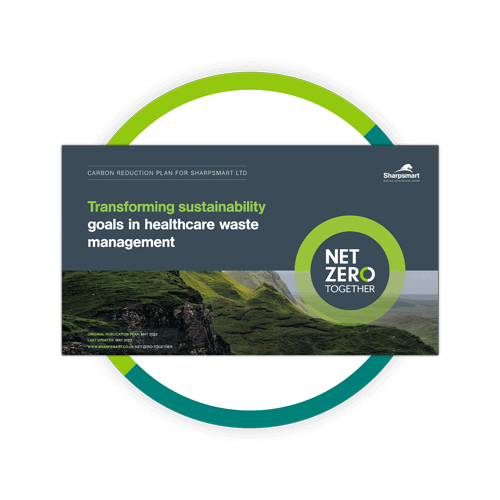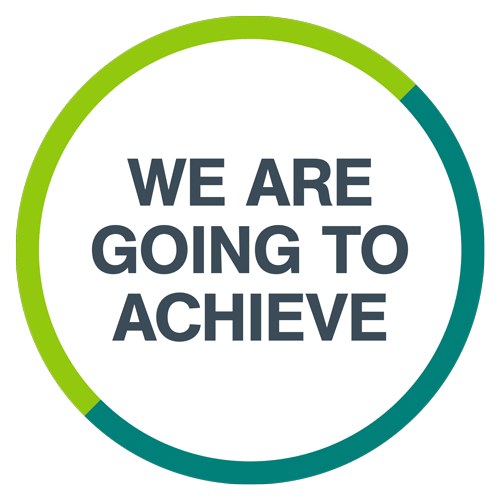Aligning With the NHS Net Zero Supplier Framework

It’s no mean feat to meet the purchasing requirements of the NHS – a gargantuan publicly funded healthcare system with growing demands which have become a lot more stringent since its commitment to reaching Net Zero. It’s crucial for suppliers to align with the NHS Net Zero Supplier Framework to create a greener healthcare industry, but for businesses on the smaller side, it can be a challenging endeavour. Committing to sustainability isn’t a new concept for Sharpsmart, we’ve spent 20+ years doing it, but the route to Net Zero is a journey that we’re having to navigate as we grow…
TOPICS WE WILL COVER:
1 / The NHS’s key to achieving Net Zero.
2 / Creating a Carbon Reduction Plan.
3 / Working to provide social value.
4 / Filling out the Evergreen Sustainable Supplier Assessment.
5 / Navigating the Net Zero Supplier Roadmap.
6 / Combatting Modern Slavery.
7 / The route to Net Zero, one step at a time.
The NHS’s Key to Achieving Net Zero
A recent blog published by the Head of Sustainability at NHS Supply Chain, Heidi Barnard, highlighted that collaboration between the NHS and its suppliers is key to achieving Net Zero. This prompted us to draw attention to the blog and raise awareness amongst other suppliers, and also to highlight how we’re working towards overcoming the challenges of meeting the purchasing requirements of the NHS. To do this, we’ve borrowed the ‘Five Asks’ of the NHS Supply Chain to show how we’re undertaking this journey as a smaller business.
Creating a Carbon Reduction Plan
Pursuing waste management solutions that reduce environmental impact is part of our foundation – focusing on sustainable products, waste prevention and reduction initiatives, and innovative treatment processes.
We work hard to ensure our sustainability strategies drive improvements not only for our own carbon reduction goals but also for those of our partners – an example of our commitment to NHS sustainability goals is our target to reach Net Zero by 2040.
To help achieve it, we’ve created our Carbon Reduction Plan and Sustainability Playbook which consists of three core goals that everything else in our plan has been built upon:
- Net Zero Carbon Emissions: Cutting our energy/fuel use, adopting low-carbon energy sources, and offsetting any remaining emissions.
- Zero Waste to Landfill: Committing to eliminating and/or diverting all waste into the most sustainable outlets through product/process redesign and collaboration with like-minded partners.
- Build a Sustainable Value Chain: Offer customers a true circular economy service by driving sustainability changes throughout our supply chain.
If you’d like to learn more about our specific initiatives for carbon reduction and the challenges we’re expecting to face, please see our blog on our carbon reduction plan.
Working to Provide Social Value

To help us continue working to provide social value we’ve created our ‘Four Pillars’: Environment, Workplace, Community, and Philanthropy, which we prioritise in relation to the product or service we’re providing.
- Environment: Striving to ensure our product or service aligns with sustainability principles, aiming to reduce our carbon footprint and support our customers in reaching Net Zero.
- Workplace: Maintaining a diverse and inclusive work culture, providing equal opportunities and supporting the health, welfare, and happiness of our employees.
- Community: Actively supporting projects that bring about positive change and improve the quality of life in our local communities.
- Philanthropy: Dedicating business time and resources to charitable causes, reinvesting a portion of our profits into initiatives that create social value.
Regularly assessing key performance indicators related to each of our ‘Four Pillars’ helps us understand the impact our products and services are having on society and the environment. The metrics we monitor include our carbon emissions, employee satisfaction and engagement levels, contributions to local communities, and positive outcomes from our philanthropic activities.
Some of the social value initiatives we’re especially proud of are:
- Reducing needlestick injuries and waste-related infection risks.
- Tackling climate change by reducing greenhouse gas emissions.
- Targeted recruitment drives offering employment opportunities around our facilities.
- Organised fundraising events for our customers’ chosen charities.
-
Ad hoc donations and quarterly donation lotteries for customer charities.
To further improve our offerings we’ve established a working group and introduced regular meeting sessions to plan ongoing and future social value initiatives.
Oh and not to forget, our bid team did a sponsored climb of Snowdon and after a full preceding month of sunshine, it poured down for the entirety of their climb.
Filling Out the Evergreen Sustainable Supplier Assessment
We’re currently filling out the Evergreen Sustainable Supplier Assessment to ensure we can better align with the Net Zero and sustainability ambitions of the NHS and achieve our vision of us reaching Net Zero together.
Navigating the Net Zero Supplier Roadmap
Our understanding of the Net Zero Supplier Roadmap has helped us to make preparations ahead of the upcoming milestones and harmonise these with our Carbon Reduction Plan. When it comes to publicly reporting targets and emissions to demonstrate our progress through published reports, we’ve partnered with carbon tracking specialists SmartCarbon. We’ve also established our in-house data lake for capturing, monitoring, measuring, and reporting on our carbon reduction progress.
Combatting Modern Slavery
Although we don’t meet the criteria to be legally required to publish a modern slavery statement, we voluntarily produce one to demonstrate our commitment to eradicating it. We have various roles handling our anti-slavery initiatives and policies that uphold our stance on modern slavery:
- Open Door and Whistleblowing Policy: Encouraging communication in compliance with the Public Interest and Disclosure Act 1998.
- Dignity at Work – Equal Opportunities & Harassment Policy: Promoting equal opportunities and a discrimination-free working environment.
- Corporate Social Responsibility: Committing to ethical practices and environmental responsibility.
- Supply Chain Management: Avoiding any dealings with businesses involved in slavery or human trafficking.
-
Supplier Due Diligence: Assessing new and existing suppliers through our SS-14 Supplier questionnaire.
Our recruitment team follow a robust process that includes multiple screenings and right-to-work checks to prevent modern slavery and human trafficking. If we need agency support, we only use reputable agencies approved through our supply chain management process. We also use our online learning platform to raise awareness and educate our employees on modern slavery and the impact it has.
The Route to Net Zero, One Step at a Time
As we mentioned earlier, the route to Net Zero is a journey and despite taking it one step at a time we’ve come on in leaps and bounds since we started. We’re continually growing and shaping our business to meet the requirements of the NHS by doing all we can to improve our knowledge and understanding and applying what we learn. We’re not saying it’s done, it’s a process, and we’re doing everything we can to continue aligning with the NHS Net Zero Supplier Framework so that we can reach Net Zero together.
Do you want to learn more about how we’re aligning with NHS purchasing decisions? Get in touch!
